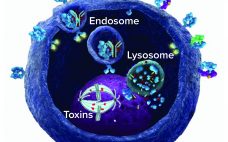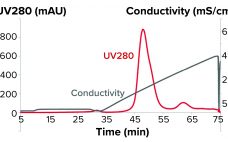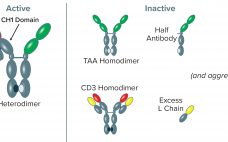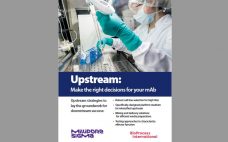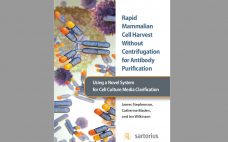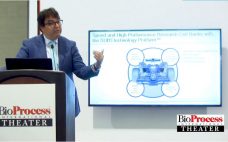G-protein–coupled receptors (GPCRs) are a large and diverse family of seven-transmembrane–domain proteins expressed on the surface of human cells. These molecules respond to external stimuli by initiating signal-transduction pathways that affect the expression of a large family of genes — which, in turn, regulate a range of vital physiological processes and functions. Figure 1 illustrates the general pathways of GPCRs. Without these proteins, humans simply could not survive: Without β-adrenergic receptors, we could not regulate our blood sugar, for example;…
MAb
Reduce Downstream Processing Costs for MAbs By Switching to a Two-Step Platform
Downstream processing operations make up to 80% of the total costs for processing biotherapeutics. Given the current drive to reduce downstream costs, chromatographers and process engineers will need to streamline processes. Herein, we describe the benefits offered by using Tosoh’s two-step process for purifying monoclonal antibodies (MAbs) and compare that method with the standard industrial process. By combining high-performance protein A capture and a single polishing step on salt-tolerant anion-exchange resin, Tosoh’s approach can reduce downstream costs by 45% and…
Capture of CH1-Containing Bispecific Antibodies: Evaluating an Alternative to Protein A
Bispecific antibodies (BsAbs) are designed to recognize and bind two different antigens, in many cases for the purpose of immune effector-cell activation to destroy cancer cells (1). Such BsAbs mediate cell killing by binding simultaneously to an antigen that is overexpressed on tumor cells and to the CD3 receptor, activating cytotoxic T lymphocytes (2). Using proprietary UniRat human heavy-chain technology combined with OmniFlic human fixed–light-chain antibody technology licensed from Ligand Pharmaceuticals, Teneobio has produced several bispecific antibodies, each targeting a…
eBook: A Light-Chain Platform for Developing Bispecific Antibodies
Biopharmaceutical researchers are focusing on novel platforms to quickly develop bispecific antibody (BsAb) therapies for treating complex diseases such as cancer. BsAb therapies offer several advantages because they are designed to bind two unique epitopes. In this report, Bill Lundberg, president and chief executive officer at Merus, describes his company’s efficient approach to developing BsAbs using “common light chain” technology and other proprietary strategies. Lundberg also addresses the company’s approach to typical BsAb development and manufacturing challenges. Fill out the…
Upstream: Make the Right Decisions for Your mAb
Bioprocess decisions made during upstream operations can be difficult to reverse at later, more costly stages of biologic manufacture. They even can require significant backtracking, wasting precious time, labor, and material. Read this Special Report to learn ways to optimize monoclonal antibody bioprocessing upstream. Specifically, you will learn about different tools that small and emerging biotechnology groups can use to ensure robust cell-line selection novel media formulations designed for intensified upstream processing in perfusion modes mixing and delivery solutions that…
Rapid Mammalian Cell Harvest Without Centrifugation for Antibody Purification: Using a Novel System for Cell Culture Media Clarification
Monoclonal antibody (MAb) expression systems typically use signal peptides to ensure secretion of antibodies into cell culture media. Although that reduces the complexity of purification and prevents the need for cell disruption, it does require using expensive and time-consuming techniques to separate cells from antibody-containing cell culture fluids. In this study, we describe our tests of the novel Sartoclear Dynamics Lab V system (Sartorius S Lab Instruments GmbH and Co. KG) for rapid clarification of cell culture media without requiring…
Rapid Implementation of Novel Affinity Purification: Manufacture of Commercial-Scale Next-Generation Antibody Therapies
The rapid and cost-effective production of conventional monoclonal antibodies (MAbs) for clinical trials and commercial supply has contributed toward their wide adoption. Production processes have become more efficient because common purification processes are being used across structurally similar MAbs during key steps of process development and manufacturing. Such successful platform approaches can remove unwanted impurities and are stable across processing conditions, irrespective of the MAb being purified. In addition, they are readily available at the required volume to support large-scale…
Antibody Derivatives: Deconstructing MAbs for the Next Wave of Biotherapies
Although they make up the largest and most successful category of biopharmaceuticals so far, monoclonal antibodies (MAbs) suffer from certain disadvantages. Some companies are addressing those limitations by deconstructing MAb molecules to create new emergent therapeutics. These antibody derivatives include: antibody fusions and fragments, bispecifics, trifunctional antibodies, and more. This eBook combines market analysis from consultant David Orchard-Webb with technical discussion from BPI cofounder and senior technical editor Cheryl Scott. It also includes commentary from editorial advisor Michiel Ultee and…
Monoclonal Antibodies: Beyond the Platform in Manufacturing
The vast majority of monoclonal antibody (MAb) production processes are based on fed-batch Chinese hamster ovary (CHO) cell culture and protein A affinity column chromatography capture. Increasing cost-consciousness — among innovator companies as well as biosimilar makers — has many companies looking “beyond the platform” for less expensive alternatives that may provide better results. Here the BPI editors review some state-of-the-art alternatives in upstream and downstream MAb drug substance bioprocessing as well as drug-product manufacturing. The current “gold standard” platform…
Speed Matters: Gene to GMP in Nine Months
Igor Fisch, chief executive officer, Selexis, SA Fisch first posed this question: “How can we accelerate the number of drugs going into the clinics?” Speed matters because the faster a drug can get into clinical testing, the faster it can make it to market. He discussed both Selexis and KBI Biopharma and their collaboration, which started in 2012 when KBI developed a heterodimer purification process. JSR acquired both companies with an interest in entering the life sciences business. Selexis has…

